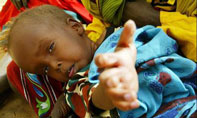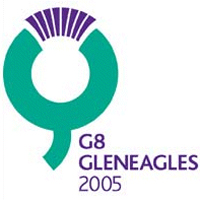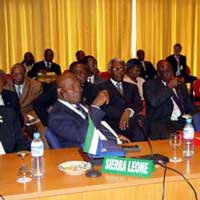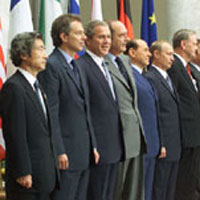- About Us
- Columns
- Letters
- Cartoons
- The Udder Limits
- Archives
- Ezy Reading Archive
- 2024 Cud Archives
- 2023 Cud Archives
- 2022 Cud Archives
- 2021 Cud Archives
- 2020 Cud Archives
- 2015-2019
- 2010-2014
- 2004-2009
 |
Live8, Darfur and G8 |
On Saturday, July 2nd a spectacular showcase of artists in concert worldwide formed part of a renewed global campaign for action against social and political injustices in Africa, and left few of the massive crowds in attendance disappointed.
 Bob Geldof's concerns about 'recycling' his twenty'year'old event were overwhelmed by the will to eradicate the social and political evils of Africa, and to direct G8 leader's attention to the troubled continent.
Bob Geldof's concerns about 'recycling' his twenty'year'old event were overwhelmed by the will to eradicate the social and political evils of Africa, and to direct G8 leader's attention to the troubled continent.
For decades now, hollow words and empty promises about curing the ails of Africa have been made time and time again 'more recently by some of today's G8 leaders themselves. Issues of serious human rights violations, poverty, inequality and injustice are not new and have always been on the world's agenda. Yet thus far, no serious efforts have been truly made to reduce the scale of imminent threat to Africa's peoples. G8 leaders undoubtedly have the power to change the legacy of misery in Africa, but rarely does such a goal reach the top of their list of priorities.
 30,000 children reportedly die each day in Africa. In reality, the number is much higher. If the mortality rate of Darfur children was included, for instance, the figure rises dramatically. The current mortality rate in Darfur stands at a minimum of 10,000 per day, excluding the death rate of people in inaccessible areas. In addition to poverty, the high death rate in Darfur has been mainly caused by the Sudanese regime and it's allied Janjaweed militias burning and killing the innocent population. Nonetheless, some G8 nation institutions still conduct business as usual with the Sudan and willingly shake hands with the promoters of a culture of impunity and genocide in Darfur that are guilty of committing war crimes and crimes against humanity.
30,000 children reportedly die each day in Africa. In reality, the number is much higher. If the mortality rate of Darfur children was included, for instance, the figure rises dramatically. The current mortality rate in Darfur stands at a minimum of 10,000 per day, excluding the death rate of people in inaccessible areas. In addition to poverty, the high death rate in Darfur has been mainly caused by the Sudanese regime and it's allied Janjaweed militias burning and killing the innocent population. Nonetheless, some G8 nation institutions still conduct business as usual with the Sudan and willingly shake hands with the promoters of a culture of impunity and genocide in Darfur that are guilty of committing war crimes and crimes against humanity.
"As long as poverty, injustice and gross inequality persist in our world, none of us can truly rest."
The words of former South African President Nelson Mandela during his speech at Live 8 in Johannesburg resonate, and with the exception of those protected by their own corrupt and totalitarian regimes, these ills affect all Africans.
Indeed, the message of the forthcoming African Union and G8 summits this July should not only be focused upon debt cancellation and further aid to Africa, but also upon curbing corruption and abating conflicts in the region, and bringing those guilty of war crimes and crimes against humanity to justice. Without initiative from a few African Union leaders, the fear exists that even if the G8 promises to deliver aid and support to Africa, it will not reach those 30,000+ children dying each day, and rather end up in the pockets of corrupt leaders and human rights abusers.
 On the 30th of June in a speech at the Freer Gallery in Washington D.C, President George Bush asserted, ...The violence in the Darfur region is clearly genocide. The human cost is beyond calculation.... Is it possible that George Bush and other G8 leaders could show the courage and leadership needed to put a stop to the mass atrocities being carried out by the Khartoum regime and it's Janjaweed militias in the Sudan?
On the 30th of June in a speech at the Freer Gallery in Washington D.C, President George Bush asserted, ...The violence in the Darfur region is clearly genocide. The human cost is beyond calculation.... Is it possible that George Bush and other G8 leaders could show the courage and leadership needed to put a stop to the mass atrocities being carried out by the Khartoum regime and it's Janjaweed militias in the Sudan?
The following day U.N chief Kofi Annan offered that history would probably judge that the international community has been slow to respond to the crisis in Darfur and has learned nothing from the genocide in Rwanda. History will most definitely judge the leaders of the G8 even more harshly if they refuse to stop and prevent the bloodshed after this latest opportunity to assist via the summit at Gleneagle.
The fact remains that the sooner G8 leaders stop helping corrupt African Union leaders, stop providing them with military equipment, stop conducting business with human rights abusers and actively hold accountable those who commit crimes against humanity and war crimes, the sooner poverty can be eradicated in Africa.
